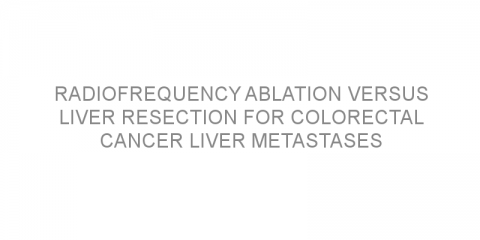In a nutshell The authors presented guidelines for treatment of advanced, relapsing and castration-resistant prostate cancer. Some background The knowledge about treatment of advanced, metastatic (spread of the cancer) and castration-resistant (cancer that continues to grow despite low levels of testosterone) prostate cancer continues to...
Read MoreCurrent stage -Stage IV Posts on Medivizor
Is lymph node density a better predictor of cancer-specific survival than number of positive lymph nodes?
In a nutshell This study compared the predictive ability of lymph node density and the absolute number of positive lymph nodes in patients with prostate cancer and lymph node invasion. Some background Radical prostatectomy is the surgical removal of the prostate gland in prostate cancer. Chemotherapy may be used following surgery to...
Read MoreNew methods for determining melanoma prognosis
In a nutshell This study examined the prognostic value of S100B and lactate dehydrogenase in non-resectable metastatic melanoma. Some background Melanoma that has metastasized, or spread to other areas of the body, has a poor prognosis. While 5-year survival rates can be as high as 41% in patients whose cancers are resectable, or able to be...
Read MoreA phase I trial of the new PI3K inhibitor SAR245409
In a nutshell This study examined whether SAR245409 is safe and effective when used in combination with erlotinib (Tarceva). Some background SAR245409 is a newly developed drug, belonging to a class of agents called PI3K inhibitors. PI3K is a specific molecular pathway which propagates cancer cell growth and spread. Inhibiting the PI3K pathway is...
Read MoreRadiofrequency ablation versus liver resection for colorectal cancer liver metastases
In a nutshell This meta-analysis (an analysis of data combined from several similar studies) compared the efficacy of radiofrequency ablation versus liver resection in patients with colorectal cancer liver metastases. Some background Colorectal cancer liver metastasis refers to cancer that has spread to the liver. Liver...
Read MoreIs PET/CT scan useful in detecting lung metastasis in patients with colorectal cancer?
In a nutshell This study examined the frequency of detecting indeterminate lung lesions on CT of patients with colorectal cancer and investigated if PET/CT was useful in detecting the malignant cases. Some background Colorectal cancer staging describes the severity of one’s cancer based upon the size and extent of the primary tumor and...
Read MoreSelumetinib; a new MEK inhibitor tested
In a nutshell This phase II trial evaluated the efficacy and safety of selumetinib in combination with docetaxel (Taxotere) as first-line treatment for patients diagnosed with advanced melanoma. Some background Despite recent advances in targeted biological agents for the treatment of BRAF-mutated melanoma, treatment options for wild-type BRAF...
Read MorePD-1 inhibitors show promising early results
In a nutshell This article reviews recent news regarding two new lung cancer drugs: nivolumab and MK-3475. Some background Nivolumab and MK-3475 are new drugs that belong to a class referred to as PD-1 inhibitors. PD-1 inhibitors work by blocking a specific protein (PD-1 or programmed cell death protein 1) found on many cells of the immune...
Read MoreMetformin improves outcomes in metastatic prostate cancer patients
In a nutshell This study explored the use of metformin (Glucophage) in prostate cancer patients undergoing androgen-deprivation therapy. Some background Prostate cancer is often dependent on androgens, or male hormones such as testosterone, for growth. Therefore, a standard treatment in advanced or metastatic (spread of disease to...
Read MoreWhat’s next after chemotherapy: bevacizumab alone or bevacizumab plus erlotinib?
In a nutshell This trial compared two treatment strategies following chemotherapy for advanced and metastatic lung cancer patients: bevacizumab (Avastin) alone versus bevacizumab and erlotinib (Tarceva). Some background Bevacizumab and erlotinib target specific weaknesses found in cancer cells. Bevacizumab works by blocking the tumor’s...
Read MoreGefitinib confirmed as safe and effective among Caucasian patients
In a nutshell This study examined the safety and efficacy of gefitinib (Iressa) in EGFR-positive, non-small-cell lung cancer among Caucasian patients. Some background Many types of cancer, including non-small-cell lung cancer, are caused by genetic mutations. A mutation in the epidermal growth factor receptor (EGFR) gene leads to the...
Read MoreCirculating tumor DNA as a new biomarker
In a nutshell This trial investigated the significance of circulating tumor DNA as a biomarker for monitoring response to treatment among metastatic breast cancer patients. Some background The management of metastatic breast cancer requires frequent monitoring of response to treatment in order to avoid ineffective therapies and prevent...
Read More














